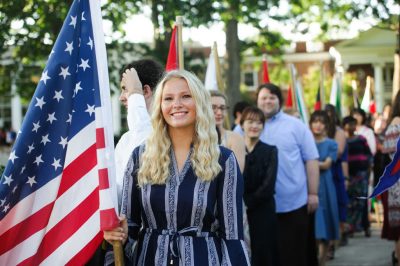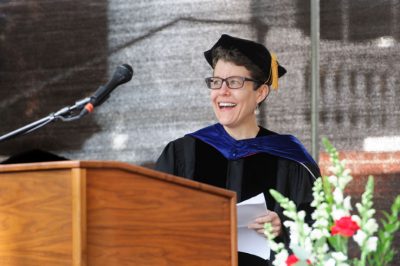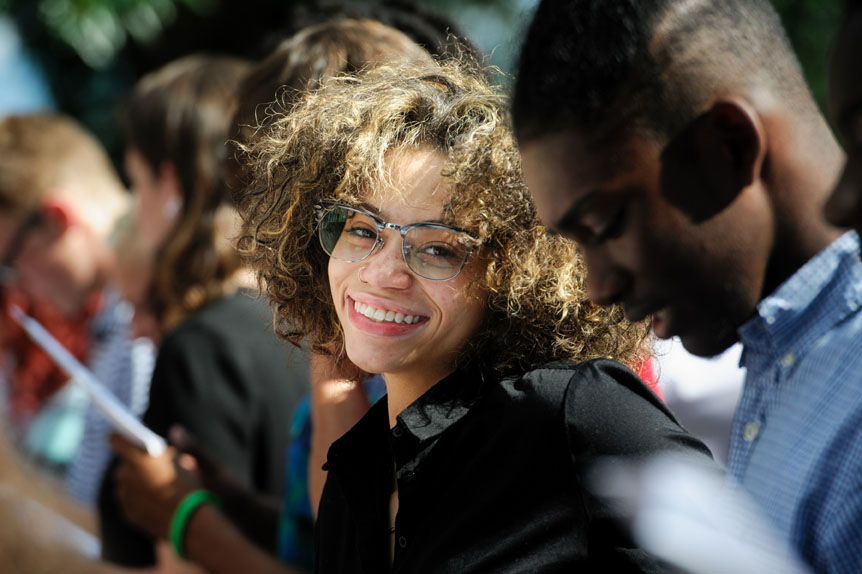The University of Lynchburg celebrated a new year and the arrival of more than 600 new students with University Day, a new tradition marking the beginning of the academic year.
The day began with a traditional Convocation and ended with a picnic dinner for the entire campus community on the Dell. In between, the University dedicated a food pantry designed as a place where community members can easily help each other. (See the WSET story here.)
The speakers at Convocation focused their remarks on the importance of becoming a cohesive community.
 The Class of 2022
The Class of 2022
“Students, you bring a diversity of experiences and cultures from your hometowns and countries around the world to be one community at Lynchburg,” Rita Detwiler, vice president of enrollment management, said.
She summarized some of the accomplishments of the incoming students, including one who participated in the Global Space Balloon Challenge, one who has given more than 500 hours of service, and one who appeared on American Idol.
“With the support of your parents, families and friends, your accomplishments have been impressive,” Detwiler said. “Your past accomplishments prove your commitment to be highly engaged in your new community.”
Student government president Lauren Farrell ’19 summarized several lessons she has learned as a Lynchburg student, and advised her peers to leave their comfort zones to try new things. “These new experiences will teach you so many valuable lessons and shape you into the person that you want to become,” she said.
‘Kitten stretcher’ and ‘grief bacon’
 Dr. Alicia Carter, a professor of German, gave a linguistic twist to the theme of community. She cited many examples of how literal translations lead an aspiring language learner astray.
Dr. Alicia Carter, a professor of German, gave a linguistic twist to the theme of community. She cited many examples of how literal translations lead an aspiring language learner astray.
For example, she recalled one student who turned in an assignment that advertised “Kätzchen Tragbahre” — literally translated, “kitten stretcher.” Eventually, Dr. Carter realized that the student must have meant “kitty litter,” but he chose the wrong definition for “litter” in his English-German dictionary.
“It’s the kind of mistake we make when we see foreign languages through our own individual, inherently limited lens,” she said.
She gave several examples of easy mistranslations to explain how cultural context defines the meaning of words. She drew laughs with phrases such as German’s “kummerspeck” (literally, “grief bacon”), which describes weight gain from emotional overeating, similar to English’s “freshman 15.”
She encouraged students to think about language when they encounter new people and to go beyond the first definition. “When we meet another person, it’s easy to pounce on the first label, the first preconception, the first definition that comes to mind,” she said. “And suddenly we’re back to the ‘kitten stretcher.’”
She said language can be like a weapon, or it can be like a key that opens doors. “When someone acts in a way that we don’t like or understand, it’s our knee-jerk reaction to assume we understand them and their motivations.
“But … the answer is to not jump at the first or second or third word in our individual lexicon — the easy assumption, the unexamined explanation. Instead, we need to make more of an effort to truly listen. More of a commitment to truly understand each others’ language.”
Lynchburg is home
University of Lynchburg President Dr. Kenneth R. Garren summarized the history of the institution, now in its 116th year, and its evolution from a small college to a university.
“I know that you will soon discover, if you have not already, that the University of Lynchburg is the perfect fit as you continue your intellectual journeys,” he said. “And speaking of journeys, wherever your journey leads you — a career in teaching, nursing, the sciences, business, public service, or perhaps graduate school — I hope you know that this place, right here, will always be a home for you.”


